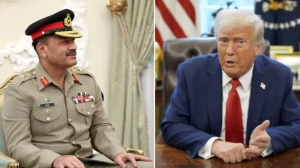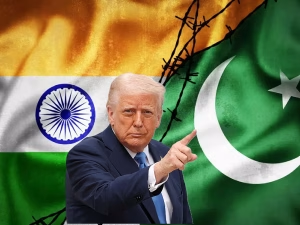New Delhi – Pak General Asim Munir is scheduled to make his second visit to the United States this week, marking an unprecedented level of diplomatic engagement between Pakistani military leadership and American officials. This upcoming trip represents the continuation of high-level military diplomacy that has intensified following recent military skirmishes between Pakistan and India, demonstrating the strategic importance both nations place on maintaining strong bilateral defense relationships.
The frequency of these visits underscores the complex regional dynamics in South Asia and America’s ongoing interest in maintaining influence with key military leaders in the region. Pak General Asim Munir’s repeated engagement with US officials highlights Pakistan’s continued strategic relevance in American foreign policy calculations, particularly regarding regional stability and counterterrorism efforts.
Reciprocal Visit to Honor US Central Command Chief

The current visit by Pak General Asim Munir serves as a reciprocal diplomatic gesture, specifically planned to attend a farewell event for US Central Command chief General Michael E. Kurilla in Tampa, Florida. This reciprocal nature of the visit demonstrates the mutual respect and professional courtesy that characterizes modern military diplomacy between the two nations.
Also Read: Trump Additional Tariff Remarks: Bold ‘No Trade Talks with India’ Stance
General Kurilla’s recent visit to Pakistan, where he was awarded the Nishan-e-Imtiaz, one of Pakistan’s highest honors, established the foundation for this reciprocal engagement. The award ceremony represented significant recognition of American military leadership by Pakistani authorities and created the diplomatic expectation for a corresponding gesture of respect.
Pak General Asim Munir’s attendance at Kurilla’s farewell event in Tampa symbolizes the personal relationships that often underpin broader strategic partnerships between nations, particularly in military and defense cooperation contexts.
Previous White House Engagement with Trump

The upcoming visit builds upon Pak General Asim Munir’s significant previous engagement with US leadership, particularly his private lunch with President Donald Trump at the White House in June. This high-level meeting represented a considerable diplomatic achievement for Pakistani military leadership and demonstrated Trump’s willingness to engage directly with key regional military figures.
The private nature of the White House lunch indicated the level of trust and strategic importance that the Trump administration places on maintaining direct communication channels with Pak General Asim Munir. Such intimate diplomatic settings typically reserved for heads of state or the most crucial strategic partners, suggesting Pakistan’s continued relevance in American regional strategy.
This previous meeting established the framework for ongoing diplomatic engagement and created the precedent for continued high-level interactions between Pakistani military leadership and American officials at the highest levels of government.
Trump’s Claims Regarding India-Pakistan Ceasefire

President Trump’s characterization of the June meeting with Pak General Asim Munir included specific claims about brokering a ceasefire between India and Pakistan, with Trump publicly praising the Pakistani military leader’s role in these alleged negotiations. These statements from the American president highlight the complex regional dynamics and Trump’s perceived role in South Asian conflict resolution.
Trump’s public praise for Pak General Asim Munir regarding ceasefire arrangements reflects the American administration’s desire to position itself as a key mediator in South Asian conflicts. However, these claims have generated significant diplomatic controversy and responses from other regional actors.
The ceasefire claims demonstrate how Pak General Asim Munir’s engagement with American leadership has broader implications beyond bilateral Pakistan-US relations, potentially affecting the entire regional strategic balance and diplomatic relationships.
India’s Response to Foreign Influence Claims
India has firmly rejected any suggestion that its foreign policy decisions, including ceasefire arrangements, are governed by foreign influence or external pressure from any nation, including the United States. This response directly challenges Trump’s characterization of his role in regional conflict resolution and Pakistan’s military leadership engagement.
Indian officials have consistently maintained their position on strategic autonomy, emphasizing that decisions regarding Pak General Asim Munir and Pakistani military engagement are made independently without external coercion or influence from American diplomatic pressure.
This stance reflects broader tensions in US-India relations and India’s commitment to maintaining independent foreign policy decision-making processes, regardless of American diplomatic initiatives or engagement with Pak General Asim Munir and Pakistani leadership.
Deteriorating US-India Relations Context
The context surrounding Pak General Asim Munir’s continued engagement with US leadership occurs against the backdrop of deteriorating relations between the United States and India. Trump’s imposition of trade tariffs reaching up to 50% on India as punishment for conducting business with Russia has significantly strained bilateral relationships.
India’s characterization of these tariffs as “unfair and unjustified” creates a complex regional dynamic where Pak General Asim Munir’s diplomatic engagement with American leadership occurs alongside American economic pressure on Pakistan’s regional rival.
This deteriorating US-India relationship potentially enhances the strategic value of Pakistan’s military leadership engagement, as America seeks alternative regional partnerships and influence mechanisms in South Asia.
Military Leadership Stability and Presidential Rumors


Despite ongoing diplomatic engagement, Pakistani military authorities have definitively dismissed speculation regarding Pak General Asim Munir potentially assuming the country’s presidency. These clarifications ensure continued focus on military leadership roles rather than political transitions.
The dismissal of presidential rumors allows Pak General Asim Munir to maintain focus on military and strategic responsibilities while continuing important diplomatic engagement with American leadership and regional security initiatives.

